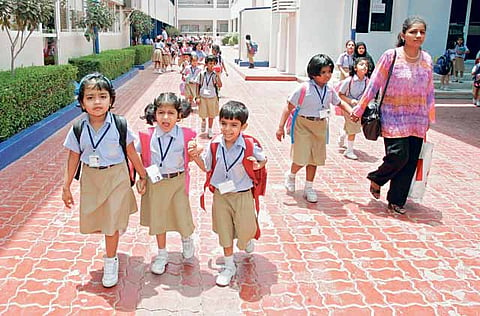Inspections help schools in Dubai fare better
Have teaching standards at many private and public schools in Dubai improved? The Dubai Schools Inspection Bureau rates the schools' performance in its annual report

Dubai: Teaching and transportation standards at many private and public schools in Dubai have improved, an education report has revealed.
The Dubai Schools Inspection Bureau (DSIB) annual report for 2010, published by the Knowledge and Human Development Authority (KHDA) yesterday on its website, compares progress made by schools in the two years since the start of school inspections in 2008.
"When it comes to teaching, there has been a marked drop in the proportion of unsatisfactory teaching in the schools that were inspected for the second time," the report said.
The report said the proportion of ‘good' and ‘outstanding' teaching in public schools had risen significantly from 34 per cent to 48 per cent.
Improvement
It said American curriculum schools had improved from last year's standing, where a quarter of all lessons were characterised by ‘unsatisfactory' teaching. Only 8 per cent of lessons have been described as ‘unsatisfactory' this year.
‘Unsatisfactory' teaching standards in Indian schools, undergoing their first inspection this year, were observed in 20 per cent of schools.
However, teaching standards were termed ‘acceptable' in 58 per cent of Indian schools, while the remaining 22 per cent obtained a ‘good' rating.
Many parents attributed the improved teaching standards to the inspection framework introduced by the KHDA, which links fee increases to a school's performance.
"This is a direct result of the school inspections. Now that there is an authority that is closely scrutinising [them], schools can no longer be complacent," said Valerie Peter, a British parent with two school-going children.
The report indicates that government schools are far from outstanding.
Dropout rate
Government schools have a dropout rate of 22 per cent for male students and 14 per cent for female students in Dubai — a figure twice that of other schools in developed countries, the DSIB report said.
The DSIB inspected 209 schools from October 2009 to March 2010 as it embarked on its second year of school inspections. Of these, 78 were public schools while 131 were private.
In the public sector, eight schools were termed ‘unsatisfactory', 37 ‘acceptable', 30 ‘good' and three ‘outstanding'.
Among private schools, 17 schools were rated ‘unsatisfactory', 69 ‘acceptable', 43 ‘good' and only two ‘outstanding'.
Inspectors visited around 15,000 classes and conducted some 1,500 interviews with students and staff. Parents of around 80,000 students completed questionnaires online.
There have also been 43 follow-through inspections, in which inspectors revisited schools which had poor ratings. Nine public schools and 19 private schools were found to have improved their overall rating by one level from the previous year's score.
The 2010 report points out that almost nine out of every 10 schools in Dubai provide education of at least ‘acceptable' quality and that students have access to a good quality of education, irrespective of the curriculum that they choose.
However, 18 per cent of Indians schools offer a curriculum deemed unsatisfactory. The quality is equally bad in 12 per cent of British curriculum schools and 17 per cent of US curriculum schools.
While private schools were found to have improved in their teaching of and provisions for Arabic and Islamic education, the key subject, a significant number were still in breach of education regulations.
Many schools insist they cannot meet set stipulations regarding this subject owing to a shortage of qualified Arabic teachers.
The report also indicates that not all schools that claim to provide the ‘national' curriculum of another country do so.
"Of the 30 private schools claiming to provide an American curriculum, for example, only a few observe the principles common to schools in the United States. The same concerns apply to a number of private schools claiming to offer a ‘British' curriculum," the report stated.
When it comes to government schools, poor motivation among students and a high drop-out rate among boys are the key problems highlighted in the report.
The report said that going by the current drop out rate in government schools of a hypothetical group of 100 male Emirati students in Grade 6, current figures suggest that only 32 will graduate on time; 47 will repeat a grade at least once, thus failing to graduate on time; and 21 will drop out from school.
The academic calender in Dubai government schools also falls short of the international average. Public schools in Dubai provide approximately 175 days of schooling a year whereas in Singapore and Japan, the academic year is about 220 days. The school year is typically around 190 days in Australia and the United Kingdom.
Likewise, the average length of a school week in Dubai public schools stands at 23 hours compared to 27 hours internationally.
Absenteeism
The tuition time in public schools has been further shortened by the widespread absenteeism that occurs after the end-of-year examinations in June.
The report also said safety standards in school buses have improved from last year. However, the procedures for dealing with issues of child protection were found to be weak in many private schools.
The report added that policies and procedures for health and safety were being poorly implemented or were non-existent in some private and public schools.
Dr Abdullah Al Karam, chairman of the board of directors and director-general of the KHDA, said that "now we have a practical tool to analyse the level of educational services provided in public and private schools and we can therefore make recommendations and focus our efforts in the areas we know require improvement."
Why do you think so many students are dropping out of school? Would you consider the KHDA report while choosing a school for your child?


